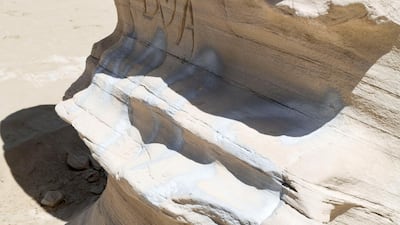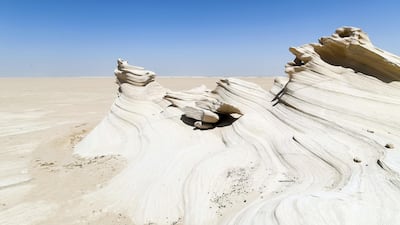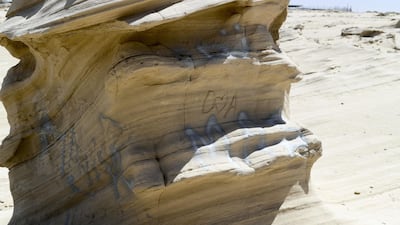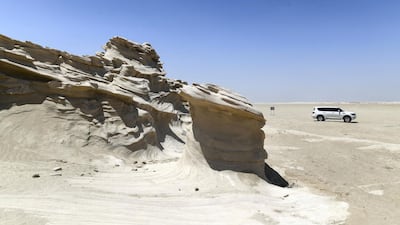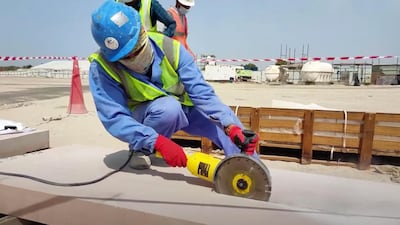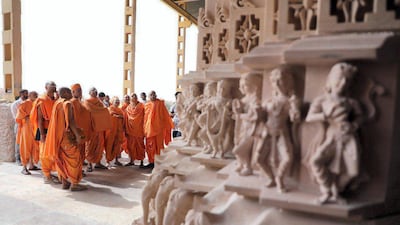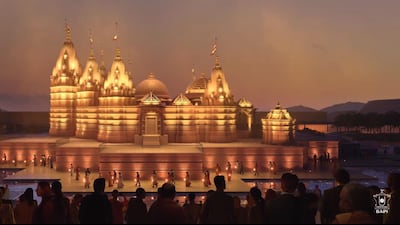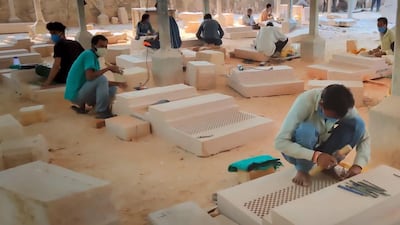Related: Vandals deface ancient rock formation in Abu Dhabi desert
Archaeologists have urged the public to respect valued heritage sites and not deface them with graffiti.
The appeal came after volunteers at the Fossil Dunes site in Al Wathba, Abu Dhabi, discovered that ancient rock formations had been vandalised.
Rocks had been spray-painted and carved with graffiti, reported volunteers attending a site clean-up event there over the weekend.
The site, in the Abu Dhabi desert, consists of a series of spectacular rock formations created over thousands of years after sand swept by the wind mixed with calcium carbonate, causing it to harden and form natural sculptures.
Its petrified fossil dunes, which look like works of art, are a popular visitor attraction on the outskirts of the city and a valuable heritage site.
"This occurrence is a terrible example of not only a lack of respect, but shows ignorance on the importance of our very precious and fragile natural landscapes and archaeological sites that are irreplaceable," said Emirati heritage expert Manal Ataya, who serves on the Rome-based International Centre for the Study of the Preservation and Restoration of Cultural Property.
"I believe it is important to not only hold those accountable with preventive measures such as legislation, site patrolling and hefty fines, but – more importantly – to run strong national educational campaigns."
Ms Ataya, who is also director-general of Sharjah Museums Authority, said lessons on "the beauty and uniqueness of the UAE's sites" should be further taught in school to "instil civic pride and a strong desire to protect sites and report offenders".
Prof Adriaan De Man, chairman of the tourism and heritage department at UAE University, said the natural heritage at Al Wathba is a unique public resource "and is to be enjoyed as such by all visitors in a respectful and sustainable manner.
“It is also part of a delicate, complex landscape, and the recent acts of vandalism have affected its integrity in irreversible ways," he said.
“Restorative techniques may provide some remedial options, but in this case they will always need to be invasive, and, therefore, destructive to some degree.”
The National went to the site on Sunday and found graffiti splashed across two sides of one rock formation that stood immediately behind a sign placed by the Environment Agency Abu Dhabi.
The sign reads: “No climbing, no defacing the formations.”
Graffiti etched on one side is Arabic text that looks like the word "qessa" – meaning "story".
Beneath it are carvings that spell D, the shape of a love heart, and H.
At the bottom, the letters "MAS" are sprayed in larger letters.
The other side of the rock is sprayed with faded letters that spell the name "Hajar", and other letters below.
The paint is partially faded, which may have been due to a clean-up operation.
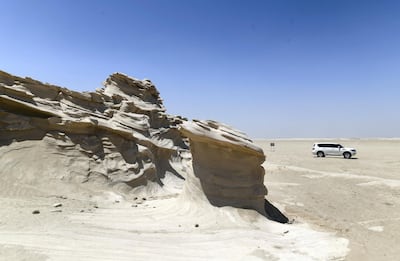
Visiting Al Wathba, it is clear that public awareness of the formations' significance and fragility is low.
At one end of the site, three children were climbing on a larger formation.
“This is my second time here. I came with my friends a week ago; they heard about it and we came for a picnic,” said a man called Edgar.
He sat on a picnic rug with some snacks, as his two young sons played around the dune.
Behind him, drawings and scribbles could be seen on the face of the dune.
"My sons drew this, they are naughty," he said.
Marks the boys had make a week earlier, using one of the numerous white stones scattered on the ground, were still clearly visible.
“I just wanted to be creative,” said one of the children.
Their friend then arrived with her father, after climbing other dunes in the area.
“They did it before I arrived. I was looking at different stones," said the girl. "I wanted to draw too."
When our reporter explained their drawings would be regarded as defacing a natural heritage site, the families were eager to clean them off.
While Al Wathba is popular for Abu Dhabi residents looking for a natural escape from the city, some visitors may not be aware of how destructive their actions may be.
“Although legal procedures are central in terms of prevention and penalties, the community plays a major part in avoiding senseless damage to heritage, through education and awareness-raising," said Prof De Man.

